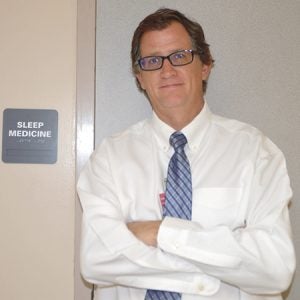Schumacher earns certification in clinical sleep health
Published 1:45 pm Tuesday, September 11, 2018
|
Getting your Trinity Audio player ready...
|
Craig Schumacher, program director of the Bryan W. Whitfield Sleep Disorder Center, has spent his 20-plus-year career in sleep medicine searching for ways to advance his knowledge and impact more lives with his expertise. As part of that search, he recently earned his Certification in Clinical Sleep Health (CCSH), allowing for even more opportunities to improve people’s lives and advocate for the importance of sleep health as a clinical sleep educator.
Schumacher explained his role in the field of sleep medicine as that of a supplement to sleep practitioners.
“We would help walk someone through the different diagnosis pathways,” he said.
He also said the difference between his responsibilities before versus after earning the credential lies in advocacy.
“The difference now is that we’re able to promote the continuing, evolving educational needs for a licensure,” he said.
The field of sleep medicine is considered a baby by Schumacher based on its 40-year life, compared to other medical practiced for much longer. The exam Schumacher took to become an a certified sleep educator was started in 2014. As such, there are less than a thousand certified sleep health educators in existence, including Schumacher.
Because of the youngness of the sleep medicine field and the newness of the certification, the full implications have yet to be seen in the field. However, Schumacher did offer an idea of how the hospital can benefit now that he is a certified sleep health educator.
He said the hospital could “increase outreach with companies whose employees in high risk jobs are susceptible to shift work and sleep depravation.” In doing so, productivity can be increased and accidents can be prevented because of the improvement of sleep health in the employees.
He also said, because of sleep health’s association with other medical conditions, physicians may see better outcomes in patients once their sleep improves.
“You’re working to identify sleep disorders [and] treating those disorders because of their link with comorbid conditions to produce better outcomes and readmittance rates. Keeping folks out of the hospital by keeping them healthier as it applies to their sleep,” he said.
Schumacher expressed positivity regarding the impact that his growing list of credentials can offer primary care physicians and sleep specialists.
“I would think there’s going to be a huge increase for the utilities that we can provide, particularly assisting local providers in a rural area,” he said.
Schumacher said not enough is known about sleep health and its importance, and that is why he became a credentialed sleep health educator. As his career continues and technology advances, Schumacher plans to “help more people in more ways” through sleep medicine.
In addition to his CCSH, Schumacher is a Registered Sleep Technologist and a Registered Polysomnographic Technologist.
(This article originally appeared in the Wednesday, September 5 issue of the Demopolis Times.)


